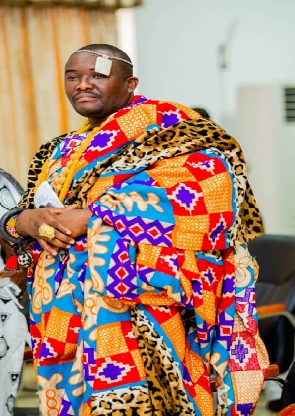 Torgbuiga Akpo Ashiakpor VI, Fiaga and Overlord of Weta Traditional Area
Torgbuiga Akpo Ashiakpor VI, Fiaga and Overlord of Weta Traditional Area
Renowned technology expert and Paramount Chief Torgbuiga Akpo Ashiakpor VI, of Weta Traditional Area in the Ketu North Constituency of the Volta Region of Ghana has issued an urgent call to action, advising the government of Ghana to swiftly embark on the digitization of the country's revered Chieftaincy institutions. This proactive measure aims to avert potential crises and foster sustainable governance within traditional leadership.
Having recognized the prevailing challenges faced by Chieftaincy Institutions, Torgbuiga Akpo Ashiakpor VI, a respected authority in the field of technology and an esteemed leader, has underscored the critical need for immediate action. By harnessing the transformative power of digital advancements, Ghana can overcome these obstacles and ensure a harmonious future for traditional leadership.
The advent of digital transformation holds immense potential to revolutionize the operations of our esteemed Chieftaincy Institutions, ushering in a new era characterized by enhanced efficiency, transparency, and accountability. By embracing modern digital tools and platforms, these institutions can streamline their administrative processes, empowering leaders, adjudicating bodies, ministries, and the government itself with unprecedented insights to make well-informed decisions.
One crucial aspect that becomes evident is the distinction between traditional boundaries of lands and the government's administrative boundaries. It is imperative to acknowledge that these two realms differ, and this disparity has left certain traditional areas vulnerable to the machinations of charlatans seeking to undermine the rich antiquity associated with these lands.
Lack of education and proper record-keeping has inadvertently contributed to this vulnerability, creating an opening for individuals with ulterior motives to manipulate the identity and heritage of traditional areas. These opportunistic actors meticulously plan their approach, often targeting lineages where the elders and kingmakers have passed away or are too feeble to actively defend their rightful legacies.
“However, by digitizing the Chieftaincy Institution, we can preserve these invaluable legacies for future generations, safeguarding their heritage from those who seek to exploit it. Through the implementation of digital systems, comprehensive records can be created and maintained, ensuring the accurate documentation of lineage, land ownership, and cultural practices. This will serve as an invaluable resource, empowering communities to protect their identity and resist any attempts at illegitimate kingdom capture.
The preservation of these legacies is not only essential for historical continuity but also for the socio-cultural fabric of our society. The digitization of Chieftaincy Institutions will create a repository of knowledge and traditions, enabling future generations to connect with their roots, understand their heritage, and uphold the values that holds and define their respective traditional areas,” he said in an interview.
Moreover, digital transformation offers an opportunity to bridge the gap between traditional institutions and the government, fostering collaboration and harmonious coexistence. By leveraging digital platforms, communication channels can be established, allowing for seamless interaction and consultation between traditional leaders and government authorities. This synergy will strengthen governance, promote inclusive decision-making processes, and ensure the collective well-being of our society.
“The digitalization process entails the creation of comprehensive digital infrastructure, including advanced data management systems, secure online portals, and accessible archives. These technological advancements will facilitate accurate record-keeping, ensuring a wealth of information is readily available at the fingertips of stakeholders, from traditional leaders to government authorities and the public.

By embracing digitization, Ghana's Chieftaincy Institutions can build stronger bridges of communication, promoting active engagement and collaborative decision-making. This inclusive approach will reignite public trust, empowering citizens to actively participate in governance matters, and fostering a renewed sense of unity and progress without having to fight over what everyone knows to be the true record of tradition or value,” he added.
Paramount Chief Torgbuiga Akpo Ashiakpor VI urges the Government of Ghana to prioritize the digitization of Chieftaincy Institutions, emphasizing the urgent need for dedicated resources and a collaborative task force. This joint effort, encompassing government agencies, technology experts, traditional leaders, and community representatives, will pave the way for a successful and transformative digital revolution.
“With the future of traditional leadership hanging in the balance, the Government of Ghana must heed the urgent call from this tech expert and Paramount Chief. By embarking on the digitization journey, Ghana has the opportunity to forge a path of resilience, prosperity, and harmony within its Chieftaincy Institutions and families. As the nation awaits the government's response, all eyes are on Ghana, anticipating the dawn of a new era where technology and tradition converge, empowering our Chieftaincy Institutions to flourish and thrive.
As we embark on this transformative journey, it is crucial to recognize the urgency of digitizing our Chieftaincy Institutions. By doing so, we protect the integrity of our traditional areas, fortify the foundation of our cultural heritage, and empower future generations to embrace and celebrate their rich ancestral legacies. Let us unite in this noble endeavor, leveraging the power of digital transformation to secure our collective heritage, promote unity, and preserve the essence of Ghana's diverse traditional areas for generations to come,” he concluded.